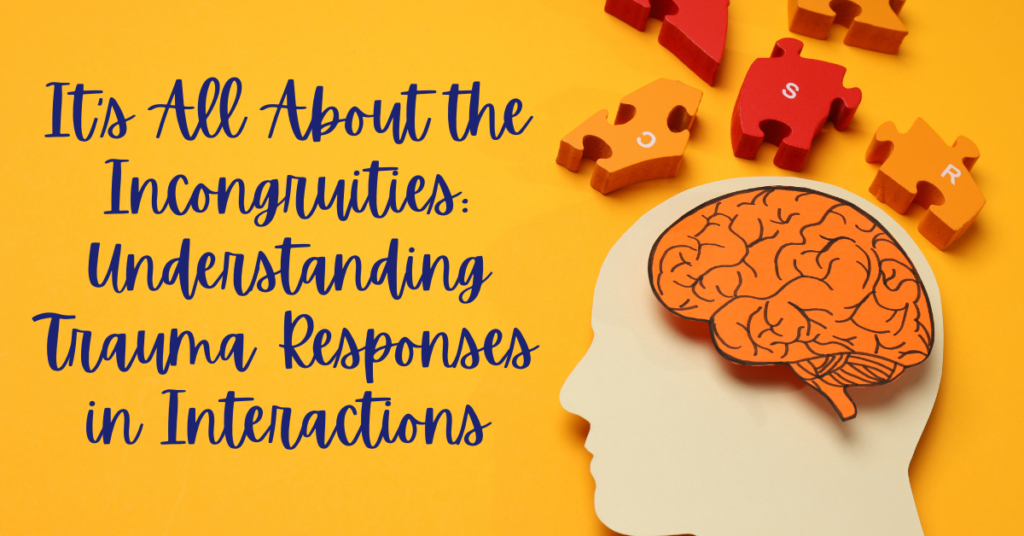
As leaders, caregivers, or simply as human beings navigating the intricate web of social interactions, we often find ourselves encountering moments of incongruence. These instances, where communication seems to break down or emotions run high or out of proportion without apparent cause , can be perplexing. In this exploration, we delve into the concept of incongruence, recognizing it as a potential indicator of trauma responses. Whether in professional settings with clients, customers, students, or patients, or in personal relationships with family and friends, understanding and addressing incongruities becomes a crucial skill in being a Self-led leader, both for yourself and for others.
The Anatomy of Incongruence as a Trauma Response
Incongruence, in the context of human interaction, can manifest in various ways. It’s that feeling when someone’s reaction appears disproportionate to the situation, when communication seems to miss the mark, or when understanding becomes an elusive goal. These are the moments when individuals are likely operating from their trauma brain, perceiving the world through the lenses of their specific traumas. I first learned this perspective through the teachings of Thomas Hubl.
Consider those times when someone reacts strongly, seemingly out of sync with the situation. It could be an exaggerated emotional response, defensiveness, or an inability to comprehend even the simplest explanations. These are tell-tale signs signaling the presence of trauma responses. Underlying these incongruities are often subconscious currents of fear, a powerful force that can alter perceptions and reactions. And let me be clear. We all do this; we all have our moments and our soft spots and our specific things that we’re more sensitive to. This is in no way a weakness or shortcoming. So no shame or blame! This is merely about understanding the situation, the person in front of you (or in the mirror) and knowing how to better connect.Shorten with AI
Supporting Others through Incongruities and Other Trauma Responses
Recognizing incongruities as potential trauma responses opens the door to a more compassionate and supportive approach. When faced with someone seemingly entrenched in their trauma brain, taking a step back and slowing down can be the first crucial move. It’s akin to dealing with a child — gentle, patient, and understanding.
Avoiding direct references to fear, which might induce shame, one can instead inquire if the person has questions, concerns, or needs additional support. The goal is to create a safe space for them to express themselves without judgment. This approach is reminiscent of the dentist who, through simple gestures like eye contact, smiling, and genuine interest, transformed a potentially tense situation into one of trust and relaxation for a child.
Self-Reflection
Understanding incongruities doesn’t stop at recognizing them in others; it extends to self-reflection. Just as others might be operating from their trauma brain, it’s crucial to acknowledge when our own trauma lenses come into play.
What triggers incongruities in our responses?
What lies beneath the surface during those moments of confusion or heightened emotions?
Exploring the reasons behind our incongruities requires delving into our own emotional landscape.
What underlying emotions are at play during those moments?
Is it fear, frustration, past experiences resurfacing?
Identifying these emotions is the first step toward addressing them.
Supporting Ourselves through Trauma Responses
Once we recognize our own incongruities, the next step is to determine what support we need in those moments. It could be as simple as taking a moment to breathe, stepping away from the situation briefly, or seeking understanding from a trusted friend or colleague. Learning to recognize and interpret the wisdom of our emotions is one the most powerful ways we can support ourselves. To get started, check out my article all about Emotional Intelligence. Committing to a practice of self-reflection is potentially the more powerful tool of all. By acknowledging our vulnerabilities and seeking appropriate support, we can better navigate the intricate dance of human interactions.
Harnessing Full Moon Energy for Reflection
Full Moon energy can serve as a supportive backdrop for introspection. While the connection between lunar phases and human behavior is nuanced and subtle, it can also be powerful, helping to prompt and facilitate deep self-reflection. Once you start paying attention to moon phases, you may begin to pick up patterns with certain things being more challenging and other things being easier at certain times of the cycle. If following lunar influences isn’t your thing, the concept of dedicating time for mindful contemplation is universally valuable. Find ways to set aside dedicated time for yourself to get introspective. And remember, self-reflection is important on a daily basis. So even if you follow lunar phases, don’t save it all up for one day a month.Shorten with AI
Incongruities and Other Trauma Responses as Opportunities
In the tapestry of human interactions, incongruities may be the threads that unravel connections or the knots that strengthen bonds. Understanding that these moments often stem from trauma responses opens pathways for empathy and support. By approaching others with patience and kindness and turning the mirror inward for self-reflection, we can transform incongruities into opportunities for growth and deeper understanding. The journey involves acknowledging the complexities of the human experience, navigating the ebbs and flows of emotions, and, ultimately, showing up for ourselves and others in love and light.

